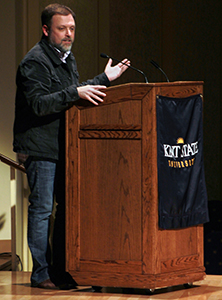Anti-racist educator discusses racism at Kent State

Tim Wise essayist and antiracist speaker speaks to students about racism in the Kiva on Thursday, Dec 05, 2013. Photo by Kristi R. Garabrandt.
December 6, 2013
Black United Students and the Undergraduate Student Government hosted “An Evening with Tim Wise” as an informative event for race relations and education Thursday in the Kiva.
Wise, a white, educated male, is known for his unbiased, clear delivery and expression of philosophy, said English lecturer Denise Harrison.
“Many of my students, when they are reading his book, don’t realize who he is,” Harrison said. “It’s amazing to see their response when they find out his is white and addressing these issues.”
Wise met with students throughout the day Thursday to learn of the work being done to address racial equality on campus.
“The real sign of progress on these issues is that moment when a person of color can stand up and say all of the kinds of things that I say in my work and be given just as much credit for saying it as I expect I will probably receive this evening,” Wise said. “Only when those of us who are white can hear it from them — not just from a white person who gives voice to them as a voice for solidarity — only then can we be in a place where we can say these kinds of programs are no longer necessary.”
On a day marked by the death of South African anti-Apartheid leader Nelson Mandela, Wise recalled his time as a student at Tulane University and his participation in advocating for the university to cease business with South African companies that supported Apartheid. On the day Mandela was released, Wise said that reactions of whites toward his work were harsh.
“I can remember people saying that now my work was over now that Mandela walked out of prison,” Wise said. “That was the rhetoric. We don’t have to change anything that we are doing because Mandela is free; the idea being that this symbol of progress, however meaningful, that that event somehow trumped the larger systemic reality of what was still happening and what would continue to happen for more years after that time.”
He compared the symbolic release of Mandela from prison to the election of President Barack Obama. On the days following the election, Wise recalled sentiments expressed that racism was obsolete and that equality had been achieved. People expressed to him that if you stopped talking about racism that it would go away.
“You can’t solve it without facing it,” he said. Similar to the election of a woman to the head of state in Pakistan not creating equality for women in that country, Wise said the election of Obama did not end racism.
“If the only reason certain folks of color are able to attain a position of power at that level is because white folks have decided to carve out an exception for them and to say that they are different from the norm but to say that the norm is still bad, that is racism,” Wise said.
Recalling recent news events dealing with systemic racism such as the arrest of black basketball players waiting for a bus in New York and police officers profiling and searching minorities in other cities, Wise said racism is a result of ideology held by the socially dominant race group in a country.
“When you’re a member of the dominant social group, you have the luxury of not noticing the stuff that other people have to pay attention to,” Wise said. “You have the luxury of not seeing that system. You have a luxury of not even seeing the inequality that is the result of the system. You have the ability to be completely oblivious.”
Student who attended the event expressed feelings of enlightenment after hearing Wise address the issues of social and racial disparity and equality.
“I found out I was one of the people who overlooked (modern racism),” said Erin Clay, junior criminology and justice studies major. “I thought, ‘No, there is no racism,’ just because I haven’t seen it. It hit personally. I didn’t know it was happening. Like the education of African-Americans and (the disparity between job opportunities). I thought that was crazy.”
Clay and others said that the way Wise used statistics to explain how African-Americans with twice the work experience were also twice as likely to be unemployed compared with white Americans half their age and half the experience was eye-opening.
“It was very informative. A lot things you don’t realize are going on even though you realize there is still a lot of racism in society,” said Jocelynn Alexander, junior criminology and justice studies major. “(An event like this) gets the information out without having to experience it firsthand, because not everybody gets that option or privilege (to hear about someone who you can relate to who did experience it).”
Senior justice studies major Landus Reed said he appreciates the work of educators like Wise because the message is important for everyone, not just students.
“In every story there is two sides and you should hear and understand both perspectives in every situation,” Reed said. “Then you can come up with your own logic and make your decision on what you believe in.”
Contact Matt Merchant at [email protected].











